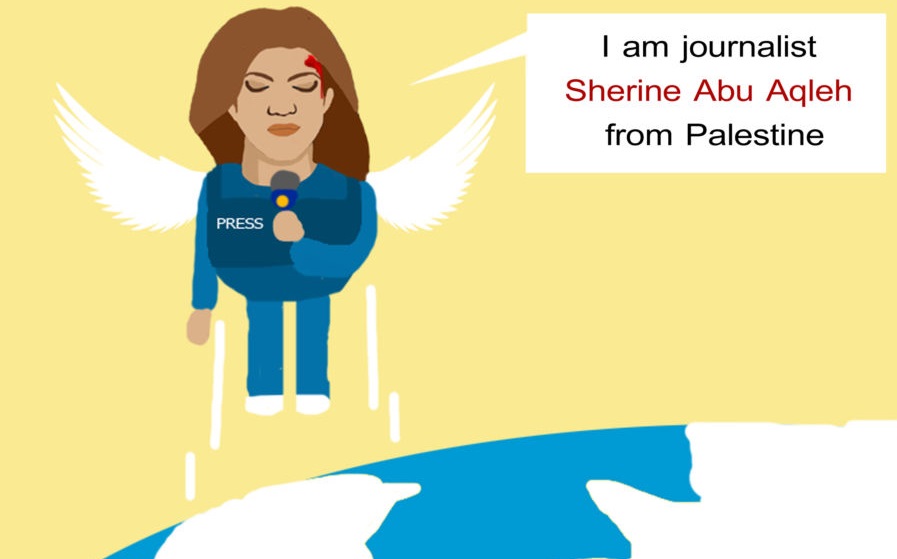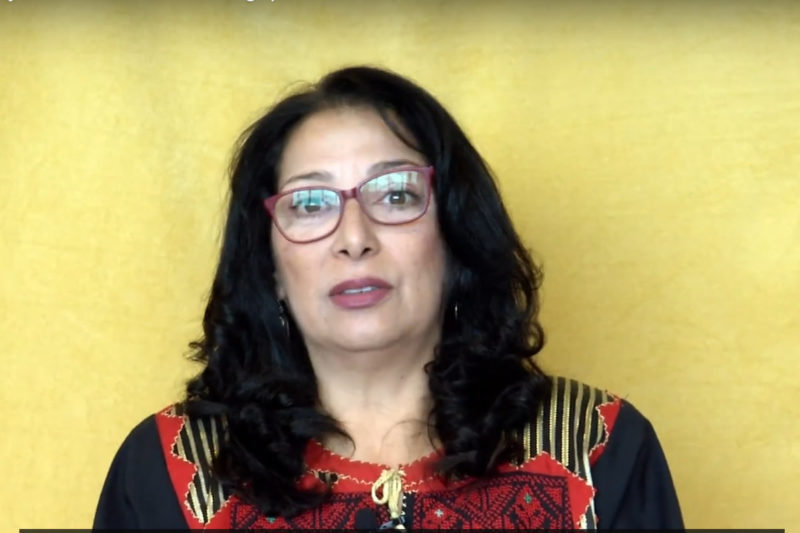When Palestinian journalist, who reports news, becomes news

Memories of Death
During this day of grief and sadness, I immediately recalled my painful memories in the Gaza Strip during the period from 31 March 2018 to 27 December 2019, when I covered the anti-Israel protests and rallies on the borderline between eastern Gaza Strip and Israel, during what was called The March of Return.
During this period of weekly confrontations and tension on the borders, around 326 Gaza Strip residents were killed, including two journalists, and 173 journalists were injured.
The Palestinian protestors held weekly rallies and protests demanding the right of return for the Palestinian refugees to their towns and villages from which their families fled, or were expelled, upon the establishment of the State of Israel in 1948.
I can’t forget when it was raining – not with water but with teargas canisters and live ammunition. I saw thousands of Palestinian youths, women and children falling to the ground after inhaling teargas or being shot by a bullet that penetrated their bodies. During these days, I was only focusing on the lens of the camera that I stood in front of, to convey a real image as a TV reporter working during that time for Taeif, the Channel of Palestinian Woman.
I really didn’t know how I could endure these difficult and dangerous situations, especially on a working day when I walked out of my door. My mother looked at my face with a worried ‘goodbye’ look, as if she was saying to herself, ‘will my daughter come back home today, or will I hear of her death in the news while working on the border covering the protests?’
On 6 April 2018, I saw my colleague Yasser Murtaja, who worked as a cameraman, falling on the floor after an Israeli army gunshot infiltrated his waist while he was wearing his blue vest, on which the word “PRESS” was clearly written. Murtaja was killed covering those protests. A few days later, another cameraman, Ahmad Abu Hussein, was killed, and then my colleague Attyea Darweesh, a local photojournalist, was hit in his face by a teargas canister. He lost one of his eyes.
I felt scared and terrified. I felt that death was very close to me. Then I wished that death would not come before I visited my city of Jaffa, from where my ancestors were forcibly displaced in 1948. I really wished not to die before visiting Jerusalem and praying at Al-Aqsa Mosque. I really wanted to see the beauty of Bethlehem and Ramallah, climb the mountains of Nablus, and eat olives and oil in the cities of Tulkarm and Jenin in the West Bank.
The news coverage of the weekly protests and rallies at the Gaza Strip border with Israel was over, and I returned home safely. Still, it wasn’t over because of the psychological impact that remained inside me.
In October 2021, I left Gaza and moved to live in Belgium after losing many beautiful things in my life. The main reason was the Israeli occupation and the Islamic Hamas government that rules the Gaza Strip. We lived in a closed box and were deprived of movement and travel, and our freedom was violated.
The most recent was during the war that erupted in Gaza on 10 May 2021. During that time, I worked as a TV news reporter for the Iran International Channel and covered the news during the 11 days of the war to convey those real images, while watching my house fall before my eyes.
I also lost my workplace in Al-Jawhara and Al-Jalaa Towers, which were destroyed by the missiles of the Israeli occupation during the war. The two towers included bureaus and offices of many newspapers, TV stations, and media production companies. That is why I loved studying journalism and media, so that I could stand in front of the big screens and defend my homeland and my Palestinian cause.
When I was a child, I used to turn on the television and watch Al Jazeera and look at the channel’s anchors and correspondents. I used to hold an empty water bottle as if it was a microphone and stand in front of the mirror to imitate the voice of the Palestinian journalists, Guevara Al-Budairi and Walid Al-Omari. Still, the one who was the closest to my heart was the late journalist Shireen Abu Akleh .
During that time, I wished that my future would be in the press field and really dreamed of becoming like Shireen, the icon of the Palestinian press. She entered every Palestinian home through the stories she produced with full professionalism, and through her coverage of assassinations and protests and how she was conveying the truth and unveiling the crimes of the Israeli occupation.
And when the Israeli occupation deliberately killed her, Shireen also demonstrated the brutality of the occupying army in how it targeted Palestinian journalists wearing the dark blue flak jacket marked “PRESS”.
She documented the cause of her homeland, Palestine, with audio and video for so many years and recorded these words in her voice on 19 October 2021:
“I will never forget the scale of destruction or the feeling that death was sometimes at a short distance. We didn’t see our homes. We used to carry cameras and move through military checkpoints and bumpy roads. We stayed in hospitals or with people we didn’t know. Despite the danger, we insisted on continuing to work. In 2002, the West Bank was subjected to an Israeli invasion that it had not experienced since the occupation of 1967. In the difficult moments, I overcame fear. I just chose journalism to be close to humans. It may not be easy to change reality, but at least I was able to make that sound out to the world.
“I’m Shireen Abu Akleh.”
Abu Akleh was killed to keep the voice of truth silent, but she won’t be the first.
According to the International Federation of Journalists (IFJ) report, issued on 5 July 2021, Israel killed 46 journalists and media workers from 2000 to 2021, in what the federation’s statement described as “systematic and organised targeting” by the Israeli occupation forces to cover up issues committed by these problematic forces of opinion.
The Israeli occupation wants to systematically obliterate the Palestinian narrative so that its crimes are not exposed or unveiled. Still, this crime will not affect our will as journalists. The occupation will not be able to prevent us from covering and conveying the truth, even if we live outside Palestine, through writing and transferring the image via the internet and social media networks and websites.
Our voice will reach the whole world.


